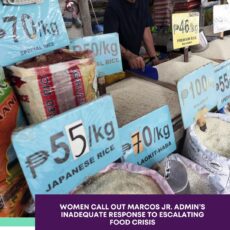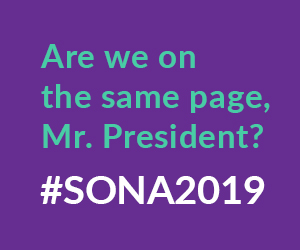The Center for Women’s Resources joins rural women, peasant leaders and advocates in the call to defend peasant women and resist rural development aggression on the commemoration of the International Day of Rural Women today.
Majority of people in the rural areas in the Philippines are peasants and indigenous peoples who have long been suffering from landlessness and land-grabbing, inequality, and displacement from their homes and livelihood. Aside from these, rural women and girls suffer multiple burdens of domestic work, violence and lack of social services such as health and education.
It is ironic that while the UN’s theme “Rural women cultivating good food for all” signifies the crucial, yet often undermined role of rural women in ensuring food security, the global food systems is persistently dominated by a corporate-driven agricultural agenda. This resulted in even more hunger, poverty, and health crises, amid the pandemic.
Since the Philippines’ accession to the GATT-WTO Agreement on Agriculture three decades, ago as well as the country’s commitments to the International Monetary Fund-World Bank (IMF-WB) group, past and present government’s laws and policies forward liberalization in the agriculture sector in the name of “global competitiveness” and “free trade.”
The Philippine government’s subservience to the neoliberal agenda has done nothing but to secure superprofit for multinational agricultural corporations from the blood and sweat of farm laborers, small farmers and fisherfolk. Multinational agriculture giants such as SUMIFRU in Mindanao rake in profits as agricultural workers suffer poor working conditions and depressingly low wages.
A women farm worker from Nagkakaisang Manggagawang Kababaihan ng Sumifru shares, “Ang working conditions sa SUMIFRU… walang kasiguraduhan sa benepisyo. Kontraktwal ang trabaho, at mahaba ang oras ng paggawa. “Dahil sa mahaba ang oras ng trabaho, kulang na kulang ang oras sa mga anak at sa bahay…Hinggil naman sa safety sa lugar ng pinagtatrabahuhan, nakakalanghap po kami ng hazardous chemicals at walang sapat na proteksyon.”
In addition, foreign loan-driven large-scale infrastructure projects in the countryside plunder the country’s natural resources while destroying the ancestral lands and cultural heritage of indigenous people. It poses risks and irreversible damage to their communities and sources of livelihood.
The construction of Jalaur River Dam in Calinog, Iloilo, a Php 11.2-billion mega dam construction project under the Duterte administration’s flagship infrastructure program, Build, Build, Build, will result in massive dislocation and flooding in the surrounding communities. Around 17,000 Tumanduks will lose homes, lives, and livelihood, and at least nine communities will be submerged. Surrounding areas will also be more prone to landslides and flooding. Moreover, heightened military presence in the area has sowed fear and unrest among indigenous communities. In addition, on December 30, 2020, nine IP leaders who strongly campaigned against the dam in Calinog and Tapaz were killed and 16 others, including six women, were arrested by the PNP and military who reportedly served dubious search warrants and planted firearms and explosives as pieces of evidence.
As the economic and political crisis worsens, state forces point their guns towards rural people’s resistance. According to AMIHAN, of the 340 farmers killed during the Duterte administration, 44 were peasant women. Sixty-five (65) of the 81 peasant women political prisoners were imprisoned under Duterte.
Relentless state-sponsored attacks, red-tagging, arrests and killings did not stop rural women from leading their communities in activities and campaigns to respond to their needs. In General Nakar, Quezon, women farmers of Kiday Community Farmers Association are leading organic farming and training for food processing initiatives to ensure their food and incomes.
These practices of organic farming, communal gardens, community-based healthcare, as well as bungkalan allowed them to provide sustenance for their communities. They have employed sustainable alternatives to collectively combat hunger and lack of support. They have also launched campaigns for the Php 15,000 agricultural subsidy and aid for those affected by the pandemic. Together with other sectors of society, they have marched hand-in-hand against state terror.
On the International Day of Rural Women, we reiterate our demand to the government to respond to the urgent demands of rural people. We enjoin all advocates, rights defenders, and supporters to stand in solidarity with rural women in the fight for land, food, and justice for all. #
- 𝗪𝗼𝗺𝗲𝗻’𝘀 𝗿𝗲𝘀𝗲𝗮𝗿𝗰𝗵 𝗡𝗚𝗢 𝘀𝗼𝘂𝗻𝗱𝘀 𝗮𝗹𝗮𝗿𝗺 𝗼𝘃𝗲𝗿 𝗮𝗻𝗼𝘁𝗵𝗲𝗿 𝗽𝗼𝗹𝗶𝗰𝗲-𝗽𝗲𝗿𝗽𝗲𝘁𝗿𝗮𝘁𝗲𝗱 𝗿𝗮𝗽𝗲, 𝗲𝘅𝗽𝗿𝗲𝘀𝘀𝗲𝘀 𝘀𝘂𝗽𝗽𝗼𝗿𝘁 𝘁𝗼 𝘁𝗵𝗲 𝗽𝗮𝘀𝘀𝗮𝗴𝗲 𝗼𝗳 𝗮𝗺𝗲𝗻𝗱𝗺𝗲𝗻𝘁𝘀 𝘁𝗼 𝘁𝗵𝗲 𝗔𝗻𝘁𝗶-𝗥𝗮𝗽𝗲 𝗟𝗮𝘄
- JUSTICE FOR BELLE*! JUSTICE FOR VICTIMS OF STATE-PERPETRATED VIOLENCE!


